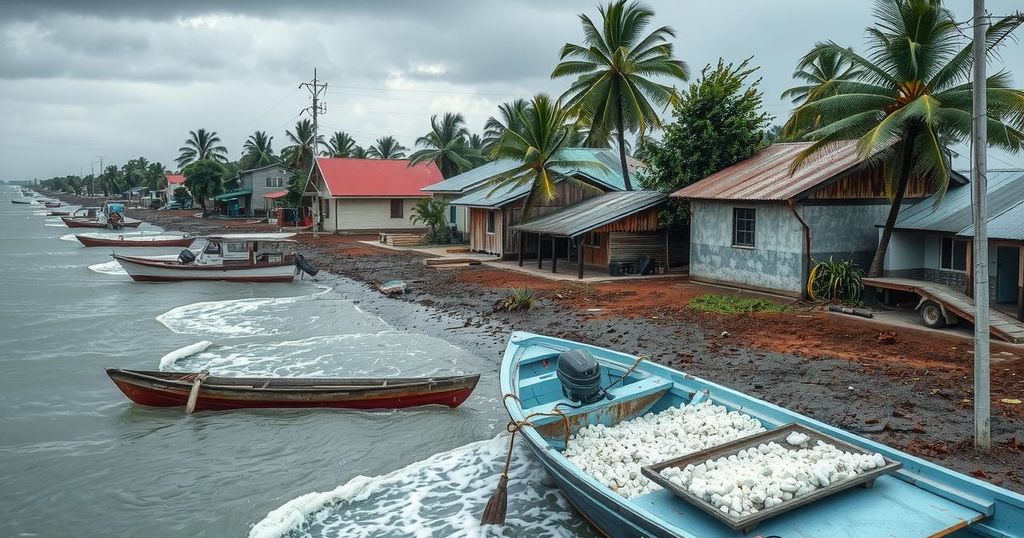World news
AFRICA, ATLANTIC OCEAN, CABO DELGADO, CHI, CHIURE, EMERGENCY RELIEF, EMERGENCY RESPONSE, INDIAN OCEAN, ISA, ISADORA ZONI, ISLAMIC STATE, MECUFI, MOZAMBIQUE, NATIONAL INSTITUTE FOR NATURAL DISASTERS, NATURAL DISASTER, NATURAL DISASTERS, UNITED NATIONS, UNITED NATIONS ’ REFUGEE AGENCY, UNITED NATIONS OFFICE FOR THE COORDINATION OF HUMANITARIAN AFFAIRS, ZONI
Stella Nguyen
0 Comments
Cyclone Chido Death Toll Rises to 75 Amid Mozambique’s Ongoing Crisis
Cyclone Chido has caused widespread destruction in Mozambique, significantly increasing the death toll to 75. The cyclone struck a region already afflicted by conflict, leading to additional humanitarian crises. Rescue efforts are hampered by damaged infrastructure, and experts warn of potentially severe weather ahead, impacting thousands who have already been displaced.
The recent devastation caused by Cyclone Chido in Mozambique has resulted in an alarming increase in the death toll, now reported at 75, nearly double the previous figure. The cyclone struck the northern province of Cabo Delgado early this week, a region already besieged by an ongoing insurgency that had previously displaced hundreds of thousands. The National Institute for Natural Disasters reports that at least 69 deaths have occurred, along with 740 injuries, as rescue teams navigate severely damaged access routes to reach affected communities. In Mecufi district, widespread destruction has been documented, with extensive damage to infrastructure.
Isadora Zoni, a reporting officer with the United Nations High Commissioner for Refugees, remarked upon her visit, “What you see is utter destruction. Everything’s been flattened.” Images illustrate the dire consequences: mud homes swept away, wooden structures reduced to mere piles of debris, and critical facilities such as maternity clinics rendered unusable due to catastrophic damage. Currently, Cabo Delgado’s population continues to endure the compounded effects of both the conflict and the cyclone.
As Cyclone Chido moved across the southern Indian Ocean, it brought winds of up to 115 miles per hour, equivalent to a Category 3 hurricane. The cyclone not only affected Mozambique but also impacted the French archipelago of Mayotte, where at least 31 lives have been claimed. Experts suggest that this cyclone could herald a particularly intense rainy season, which historically has resulted in severe storms and flooding in the region. Mozambique’s vulnerability to extreme weather events has been underscored by the fact that nearly 140,000 individuals have been displaced in recent years due to such climate phenomena.
Mozambique faces significant challenges due to its geographical location, making it prone to severe weather events, particularly tropical cyclones originating from the southern Indian Ocean. The country is additionally grappling with the socioeconomic impacts of a long-standing insurgency in Cabo Delgado province, resulting in mass displacements and increased humanitarian needs. The region’s history with tropical storms, such as the recent Tropical Cyclone Freddy and Cyclone Gombe, underscores the urgency of addressing climate-related disasters. The increased frequency and severity of cyclones raise serious concerns for the population’s resilience and the government’s capacity to respond effectively to such emergencies. Furthermore, Mozambique’s status as one of the world’s poorest nations exacerbates the vulnerabilities faced by its citizens, especially in the context of climate change.
The unfolding tragedy in Mozambique due to Cyclone Chido highlights the compounding effects of natural disasters on populations already affected by conflict and displacement. With the death toll rising and critical infrastructure devastated, urgent humanitarian efforts are needed. The cyclone serves as a grim reminder of Mozambique’s growing vulnerability to climate change and underscores the importance of addressing these challenges at both local and international levels to safeguard the well-being of its citizens.
Original Source: www.nytimes.com




Post Comment